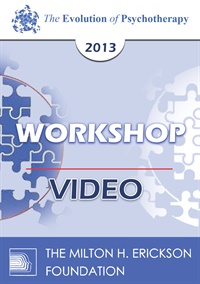- Average Rating:
- Not yet rated
- Topic Areas:
- Feedback Informed Treatment (FIT) | Psychotherapy | Speeches | Therapist Development
- Categories:
- Evolution of Psychotherapy | Evolution of Psychotherapy 2021
- Faculty:
- Scott Miller, PhD
- Course Levels:
- Master Degree or Higher in Health-Related Field
- Duration:
- 1 hour
- Format:
- Audio and Video
- Original Program Date:
- Dec 04, 2021
- Short Description:
- What can mental health professionals do to enhance their performance? Available evidence makes clear that attending a typical continuing education workshop, specializing in the treatment of a particular problem, or learning a new treatment model does little to improve effectiveness. In fact, studies to date indicate clinical effectiveness actually declines with time and experience in the field. The key to improved performance is engaging in deliberate practice. At this workshop, the latest research on deliberate practice will be translated into concrete steps all clinicians can immediately apply in their efforts to achieve better results.
- Price:
- $59.00 - Base Price
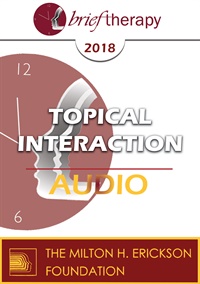
- Average Rating:
- Not yet rated
- Topic Areas:
- Topical Interactions | Feedback Informed Treatment (FIT) | Tailoring | Relationships | Therapeutic Relationship | Therapist Development
- Categories:
- Brief Therapy Conference | Brief Therapy Conference 2018
- Faculty:
- Scott Miller, PhD
- Duration:
- 57:17
- Format:
- Audio Only
- Original Program Date:
- Dec 08, 2018
- Short Description:
- Available evidence indicates that the effectiveness of psychotherapy has not improved despite 100 years of theorizing and research. What would help? Not learning a new model of therapy or the “latest” so-called “evidence-based” treatment approach. A simple, valid, and reliable alternative exists for maximizing the effectiveness and efficiency of treatment based on using ongoing feedback to empirically tailor services to the individual client needs and characteristics. Research from multiple randomized clinical trials documents that this simple, transtheoretical approach as much as doubles the effectiveness of treatment while simultaneously reducing costs, drop-out rates and deterioration. At this "Topical Interaction," participants will have a chance to address any practical issues, questions or challenges associated with incorporating outcome and alliance measures into their practice.
- Price:
- $15.00 - Base Price
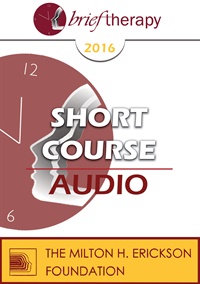
- Average Rating:
- Not yet rated
- Topic Areas:
- Short Courses | Brief Therapy | Therapist Development | Professional Practice
- Categories:
- Brief Therapy Conference | Brief Therapy Conference 2016
- Faculty:
- Bob Bertolino, PhD
- Duration:
- 1:31:31
- Format:
- Audio Only
- Original Program Date:
- Dec 08, 2016
- Short Description:
- What does a “renaissance” in brief therapy really look like? In this wide-ranging session, Bertolino explores how outcome research, positive psychology, feedback-informed treatment, and therapist development intersect to improve results. Drawing from agency data and cross-disciplinary trends in health and education, he challenges clinicians to move beyond symptom reduction toward measurable well-being, stronger fit, and deliberate practice that sharpens effectiveness over time.
- Price:
- $15.00 - Base Price
- Average Rating:
- Not yet rated
- Topic Areas:
- Clinical Demonstrations | Feedback Informed Treatment (FIT) | Relationships | Therapeutic Relationship | Tailoring | Therapist Development
- Categories:
- Brief Therapy Conference | Brief Therapy Conference 2014
- Faculty:
- Michael Yapko, PhD
- Course Levels:
- Master Degree or Higher in Health-Related Field
- Duration:
- 55:44
- Format:
- Audio and Video
- Original Program Date:
- Dec 13, 2014
- Short Description:
- This demonstration shows how real-time client feedback can transform therapy into a collaborative, adaptive process. Using tools like the Outcome Rating Scale and Session Rating Scale, a volunteer experiences how progress and alliance can be tracked session by session. Participants see how feedback helps identify stuck points, prevent dropout, and improve outcomes across diverse settings—including work with adolescents, mandated clients, and even brief crisis contacts.
- Price:
-
Sale is $29.00
price reduced from Base Price - $59.00
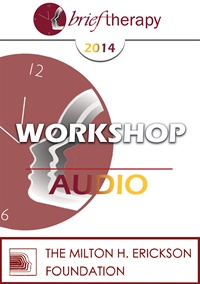
- Average Rating:
- Not yet rated
- Topic Areas:
- Workshops | Feedback Informed Treatment (FIT) | Tailoring | Therapist Development | Psychotherapy | Brief Therapy
- Categories:
- Brief Therapy Conference | Brief Therapy Conference 2014
- Faculty:
- Scott Miller, PhD
- Duration:
- 1:42:31
- Format:
- Audio Only
- Original Program Date:
- Dec 12, 2014
- Short Description:
- It’s not a pretty picture. Available evidence indicates that the effectiveness of psychotherapy has not improved in spite of 100 years of theorizing and research. What would help? Not learning a new model of therapy or the “latest” so-called “evidence-based” treatment approach. And no, not attending another CEU event or sorting through that stack of research journals by your desk. A simple, valid, and reliable alternative exists for maximizing the effectiveness and efficiency of treatment based on using ongoing client feedback to empirically tailor services to the individual client needs and characteris- tics.
- Price:
- $15.00 - Base Price
- Average Rating:
- Not yet rated
- Topic Areas:
- Workshops | Feedback Informed Treatment (FIT) | Relationships | Tailoring | Therapeutic Relationship | Therapist Development
- Categories:
- Evolution of Psychotherapy | Evolution of Psychotherapy 2013
- Faculty:
- Scott Miller, PhD
- Course Levels:
- Master Degree or Higher in Health-Related Field
- Duration:
- 1:11:21
- Format:
- Audio and Video
- Original Program Date:
- Dec 15, 2013
- Short Description:
- It’s not a pretty picture. Available evidence indicates that the effectiveness of psychotherapy has not improved in spite of 100 years of theorizing and research. What would help? Not learning a new model of therapy. And no, not attending another CEU event or sorting through that stack of research journals by your desk. A simple, valid, and reliable alternative exists for maximizing the effectiveness and efficiency of treatment based on using ongoing client feedback to empirically tailor services to the individual client’s needs and characteristics. The Substance Abuse and Mental Health Services Administration recently deemed feedback informed treatment (FIT) an evidence-based practice.
- Price:
-
Sale is $29.00
price reduced from Base Price - $59.00
- Average Rating:
- Not yet rated
- Topic Areas:
- Clinical Demonstrations | Psychotherapy | Feedback Informed Treatment (FIT) | Relationships | Therapeutic Relationship | Tailoring | Therapist Development
- Categories:
- Evolution of Psychotherapy | Evolution of Psychotherapy 2013
- Faculty:
- Scott Miller, PhD
- Course Levels:
- Master Degree or Higher in Health-Related Field
- Duration:
- 1:00:38
- Format:
- Audio and Video
- Original Program Date:
- Dec 13, 2013
- Short Description:
- Feedback-Informed Treatment (FIT) dramatically improves both retention and outcome of behavioral health services. FIT involves routinely and formally soliciting feedback from clients regarding the therapeutic alliance and outcome of care and using the resulting information to inform and tailor service delivery. Dr. Miller will demonstrate how clinicians can integrate FIT into their work regardless of theoretical orientation or professional discipline.
- Price:
-
Sale is $29.00
price reduced from Base Price - $59.00
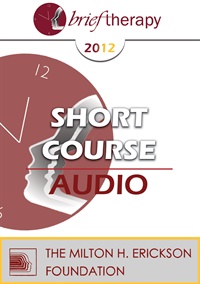
- Average Rating:
- Not yet rated
- Topic Areas:
- Short Courses | Multicultural | Therapist Development | Professional Practice
- Categories:
- Brief Therapy Conference | Brief Therapy Conference 2012
- Faculty:
- Bob Bertolino, PhD
- Duration:
- 1:26:07
- Format:
- Audio Only
- Original Program Date:
- Dec 09, 2012
- Short Description:
- Agencies face pressure to prove results while preserving creativity and clinical integrity. In this practical session, Bertolino outlines how to build a “culture of excellence” by grounding staff in a shared strength-based philosophy and tracking real-time client outcomes. He walks through dropout data, therapist effectiveness, feedback systems, and agency-wide implementation, offering a concrete roadmap for improving results without forcing allegiance to a single model.
- Price:
- $15.00 - Base Price
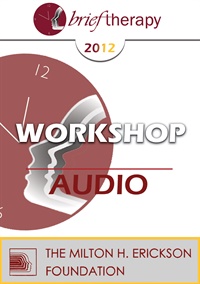
- Average Rating:
- Not yet rated
- Topic Areas:
- Workshops | Feedback Informed Treatment (FIT) | Relationships | Tailoring | Therapeutic Relationship | Therapist Development
- Categories:
- Brief Therapy Conference | Brief Therapy Conference 2012
- Faculty:
- Scott Miller, PhD
- Duration:
- 2:43:41
- Format:
- Audio Only
- Original Program Date:
- Dec 06, 2012
- Short Description:
- The field of therapy is undergoing a period of dramatic change: regulatory and documentation requirements, government cutbacks and changing insurance policies, declining incomes and economic uncertainty. Thankfully, a simple, evidence-based alternative exists for maximizing the effectiveness and efficiency of treatment based on using ongoing client feedback to empirically tailor services to the individual client needs and characteristics. Over a dozen randomized clinical trials, involving a wide range of clients and presenting complaints, document that the principles and practices associated with Feedback Informed Treatment (FIT) improve outcomes and client satisfaction by as much as 65%, cuts dropout rates in half, and decreases the risk of deterioration by one third.
- Price:
- $15.00 - Base Price




